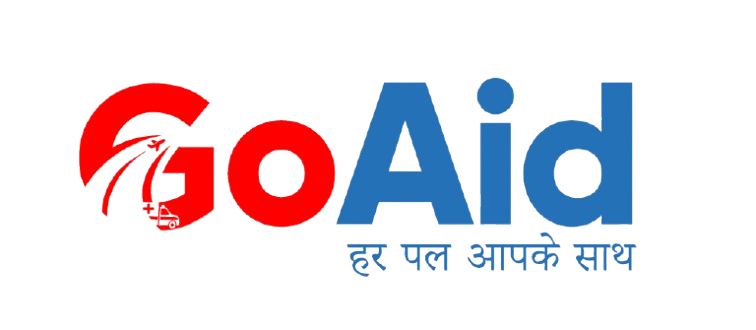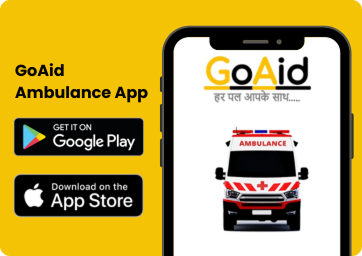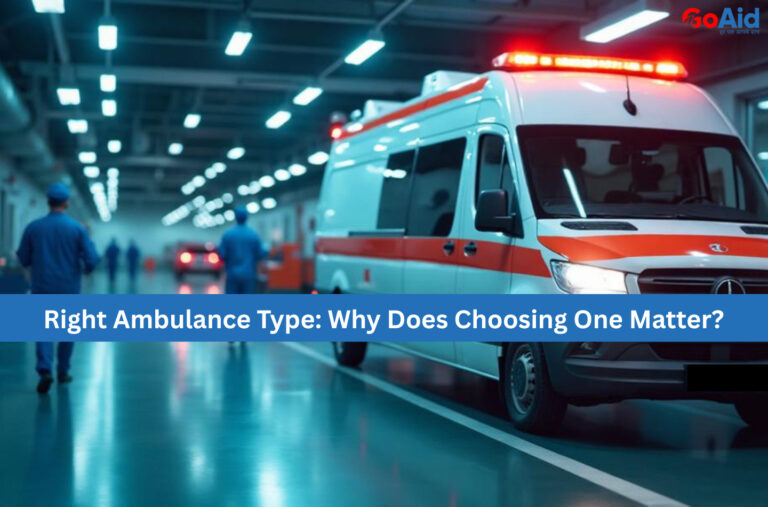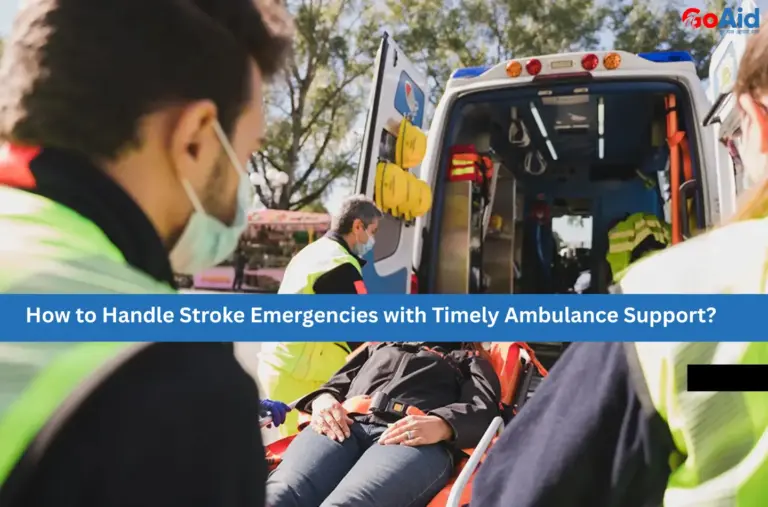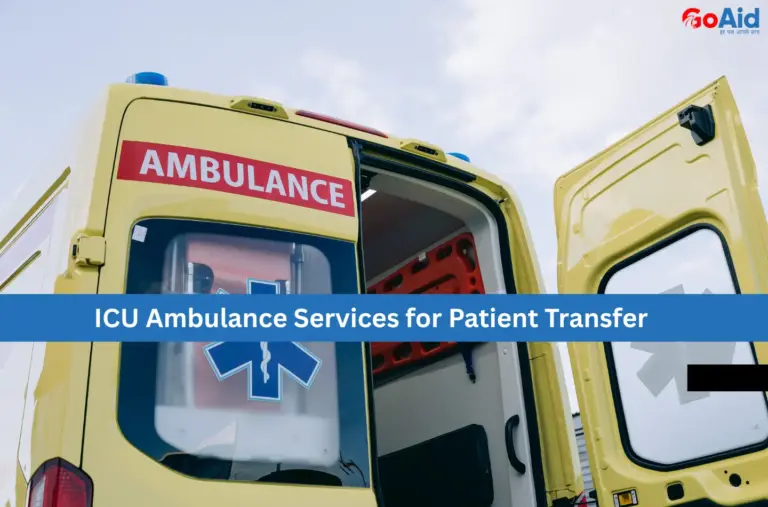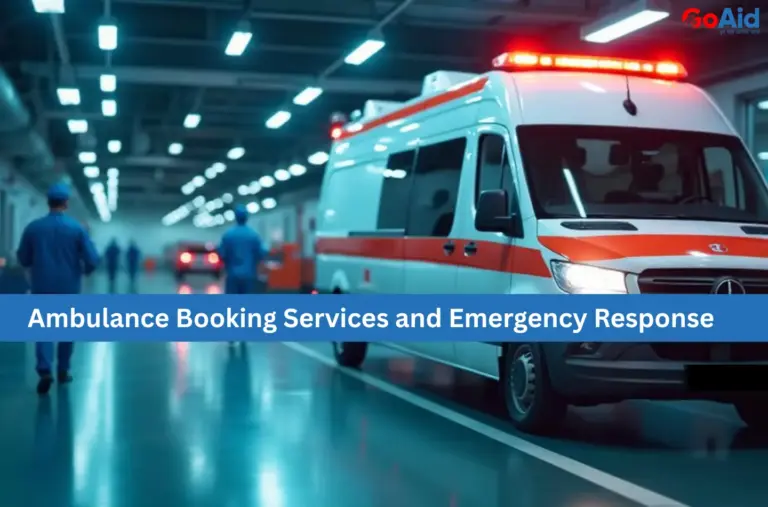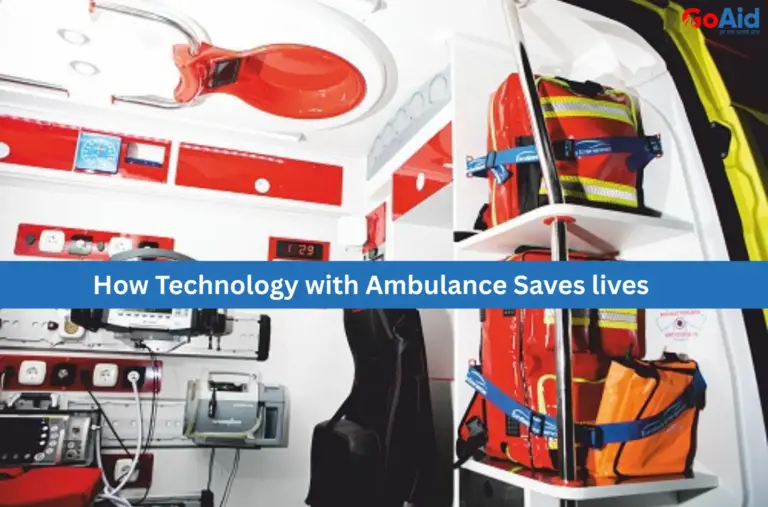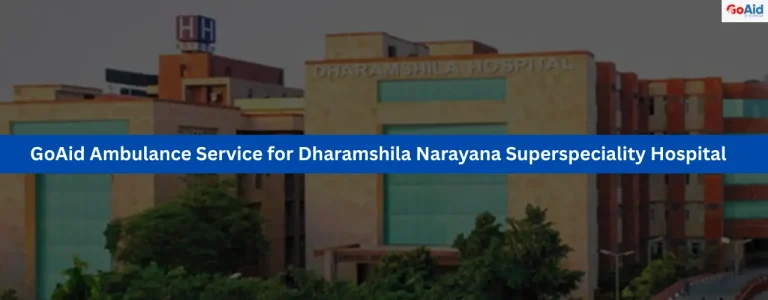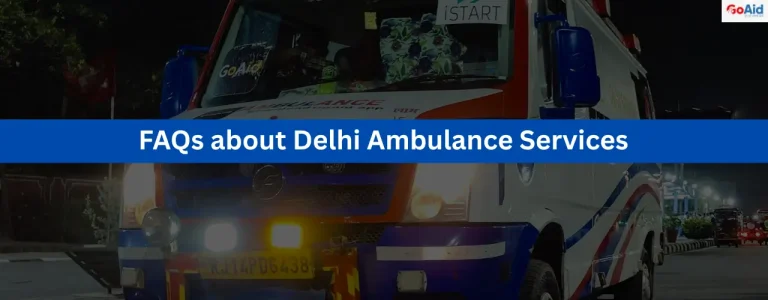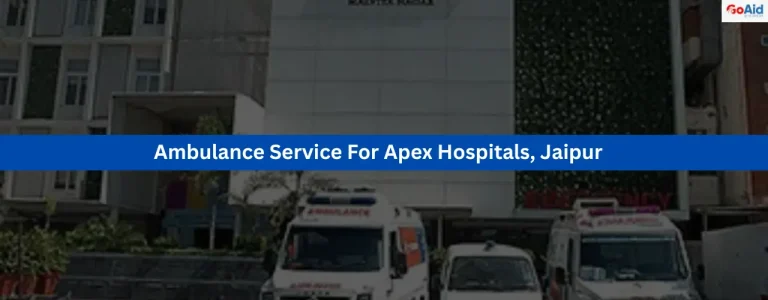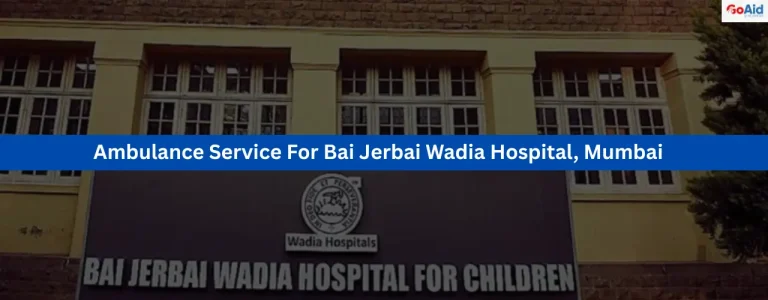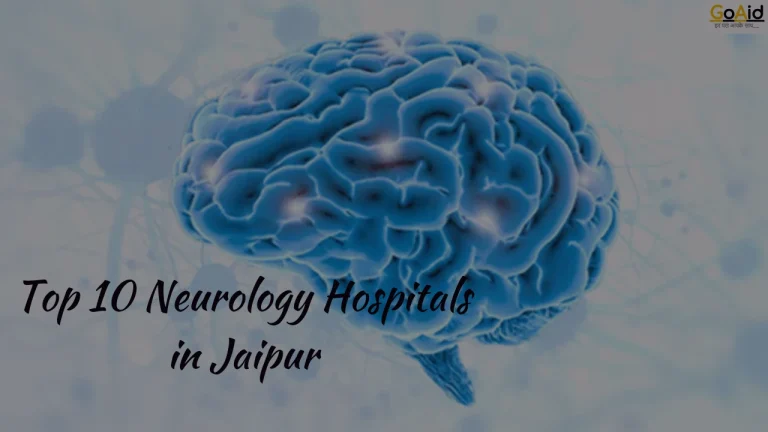In a cardiac arrest, every second can mean the difference between life and death. The human brain can start to suffer damage within minutes of the heart stopping. This makes on-time ambulance arrival absolutely critical.
Unfortunately, many cardiac emergencies worsen due to delayed medical response , and thatŌĆÖs where GoAidŌĆÖs rapid ambulance service is changing the game. With its 10-minute response target and skilled paramedics, GoAid ensures patients receive immediate care. This improves their chances of survival even in the most critical moments.
This is why, in this blog, we have provided you all the details about the importance of fast ambulance arrival during cardiac arrest, how delayed response affects patient survival, the role of trained paramedics, GoAidŌĆÖs quick support system, and use of technology in cardiac care. Are you willing to know about all these points in detail? Then read this blog to the end.
So, letŌĆÖs start ŌĆō
How Does Delayed Ambulance Arrival Affect Survival Chances?
During a cardiac arrest, every second counts. A delay of even a few minutes in receiving emergency medical care can drastically reduce a patientŌĆÖs survival rate. Timely arrival of a Cardiac Arrest Ambulance Service plays a vital role in restoring normal heart rhythm and preventing irreversible damage.
1. Reduced Oxygen Supply to Brain
Delayed ambulance arrival means the brain doesnŌĆÖt receive oxygen on time. This leads to brain cell damage or permanent neurological impairment.
2. Increased Risk of Death
In cardiac arrest, survival chances decrease by about 10% for every minute without CPR or defibrillation. This highlights why Timely Medical Emergency Help is essential.
3. Loss of Golden Minutes
The first 4ŌĆō6 minutes after cardiac arrest are crucial; late medical intervention often results in heart failure or coma.
4. Delayed CPR Initiation
Without trained paramedics from a GoAid Cardiac Emergency team, essential CPR may be delayed. This reduces the likelihood of patient revival.
5. Heart Muscle Damage
Prolonged cardiac arrest without oxygen damages the heart muscles. This makes recovery slower and more complicated.
6. Increased Hospital Complications
Patients receiving late emergency support often develop secondary complications like organ failure or respiratory distress.
7. Limited Effectiveness of Treatment
The longer the heart remains without rhythm, the harder it becomes for defibrillation or advanced life support to be effective.
8. Increased Family Trauma
Delays not only affect patients physically but also cause immense stress and emotional trauma to families awaiting medical aid.
9. Higher Mortality During Transit
A late-arriving ambulance means the patient might collapse again during transportation due to unstable vitals.
10. Loss of Public Trust in Emergency Systems
Frequent delays in ambulance response can reduce public confidence in Emergency Heart Patient Care, discouraging timely emergency calls.
How Does Fast Ambulance Help Patients with Cardiac Arrest?
Quick response during cardiac emergencies can make the difference between life and death. A Fast Response Ambulance in India, like GoAid, ensures life-saving intervention within the crucial golden minutes of a heart attack or cardiac arrest.
1. Immediate CPR and Defibrillation
GoAid ambulances are equipped with trained paramedics and automated defibrillators. This enables instant CPR and electrical shock delivery to restore heart rhythm. This immediate action significantly increases survival chances and prevents oxygen loss to vital organs.
2. Rapid Oxygen Administration
Oxygen supply is critical during cardiac arrest. GoAidŌĆÖs Ambulance for Heart Attack provides immediate oxygen therapy. This stables breathing and maintaining oxygen levels before reaching the hospital.
3. Real-Time Medical Communication
Through GoAidŌĆÖs connected systems, paramedics can communicate with hospital cardiologists in real time. This prepares doctors before the patient arrives. This synchronization ensures faster treatment and better outcomes.
4. 10-Minute GoAid Response Time
GoAidŌĆÖs Ambulance Response Time is one of the fastest in India. This ensures that emergency medical help reaches patients within 10 minutes, drastically improving recovery chances.
5. Specialized Paramedic Support
Trained GoAid cardiac paramedics deliver Emergency Heart Patient Care with precision ,┬Ā from administering emergency medications to monitoring vitals ,┬Ā ensuring professional medical attention before hospital admission.
A fast, equipped, and trained GoAid Cardiac Emergency team doesnŌĆÖt just provide transport; it provides a lifeline that bridges the critical gap between life and irreversible damage.
What is the Ideal Response Time for a Cardiac Emergency?
The ideal response time for a cardiac emergency is within 8 to 10 minutes of the incident. This short window, often called the ŌĆ£golden minutes,ŌĆØ determines the patientŌĆÖs survival chances. Immediate access to a Fast Response Ambulance in India, like GoAid Cardiac Emergency, ensures timely CPR, oxygen supply, and defibrillation before hospital arrival.
A quick GoAid Ambulance Response Time helps prevent brain damage and heart failure, significantly improving the recovery rate and overall survival of cardiac arrest patients.
GoAidŌĆÖs Role in Providing Timely Ambulance Support for Heart Patients
In cardiac emergencies, every minute counts. GoAid Cardiac Emergency Services ensure fast, safe, and professional ambulance support to heart patients when every second can decide survival.
1. 10-Minute Emergency Response:
GoAid ensures ambulances reach the patientŌĆÖs location within just 10 minutes. This provides immediate care during cardiac arrests and increasing survival chances through its rapid response network.
2. Trained Paramedic Teams:
Each Cardiac Arrest Ambulance Service includes expert paramedics skilled in advanced cardiac life support (ACLS), capable of performing CPR. This uses defibrillators, and handling critical cases with precision.
3. ICU-Equipped Ambulances:
GoAidŌĆÖs ambulances are designed like mini ICUs with ventilators, ECG monitors, oxygen systems, and other advanced tools to deliver Emergency Heart Patient Care during transit.
4. 24/7 Cardiac Emergency Availability:
GoAid operates day and night. This offers round-the-clock Timely Medical Emergency Help for heart patients across cities. This ensures no delay in care when itŌĆÖs most needed.
5. Real-Time Ambulance Tracking:
The GoAid App allows patientsŌĆÖ families to track the ambulance live. This offers transparency, peace of mind, and real-time updates during stressful cardiac emergencies.
6. Easy & uninterrupted Hospital Coordination:
GoAid paramedics communicate with hospitals before arrival. This enables doctors to prepare necessary treatments instantly and avoid precious time loss after reaching the hospital.
7. Affordable Cardiac Ambulance Services:
GoAid provides Fast Response Ambulance in India at government-approved affordable rates. This ensures high-quality cardiac emergency care is accessible to everyone, not just a few.
8. Private Ambulance for Heart Attack Patients:
GoAid offers Private Ambulance in India for cardiac patients who need specialized and comfortable transfers. This maintains both privacy and safety during critical transport.
9. Expert Cardiac Care Protocols:
GoAidŌĆÖs teams follow standardized GoAid Cardiac Emergency protocols. This ensures every patient receives accurate, timely, and scientifically guided care for better recovery outcomes.
10. Commitment to Saving Lives:
With its mission to reduce cardiac emergency fatalities, GoAid combines speed, skill, and compassion,. This proves that timely ambulance support can truly save lives every day.
The Role of Trained Paramedics in Cardiac Care
Trained paramedics are the unsung heroes in cardiac emergencies. In GoAid Cardiac Emergency Services, these professionals are crucial to providing effective Emergency Heart Patient Care.
1. Early Recognition of Cardiac Symptoms:
GoAidŌĆÖs trained paramedics are skilled at identifying early warning signs like irregular pulse, chest pain, and shortness of breath. Their rapid assessment helps initiate immediate cardiac protocols. This prevents the condition from worsening before reaching a hospital.
2. Advanced Life Support Techniques:
Each paramedic is certified in Advanced Cardiac Life Support (ACLS). They perform CPR, administer emergency medications, and use defibrillators to restore heart rhythm. This provides professional Cardiac Arrest Ambulance Service that saves lives during transit.
3. Continuous Monitoring and Stabilization:
GoAid paramedics monitor patientsŌĆÖ vital signs throughout the journey using ECG machines and oxygen support. Their constant observation ensures the patient remains stable. This bridges the crucial gap between the emergency site and hospital treatment.
4. Effective Communication with Hospitals:
Paramedics send real-time updates to hospital emergency units. This allows doctors to prepare for immediate treatment. This coordination ensures that GoAid Cardiac Emergency patients receive easy & uninterrupted medical care without losing precious golden minutes.
5. Emotional Support and Family Guidance:
Beyond medical care, GoAid paramedics provide emotional stability to both patients and families. They explain the procedures calmly and assure them of safety, creating a supportive environment that enhances confidence and patient comfort during cardiac emergencies.
Must Read: Role of GoAid Ambulance Services in Healthcare Tourism
Common Mistakes People Make Before Ambulance Arrival With Cardiac Patients
During a cardiac emergency, every second counts. However, people often make critical mistakes before an ambulance arrives, which can worsen the patientŌĆÖs condition. Awareness of these errors helps in providing safer and more effective support.
1. Delaying the Emergency Call
Waiting to see if symptoms subside instead of calling an ambulance immediately can result in life-threatening complications such as heart attack or cardiac arrest.
2. Panicking and Overreacting
Emotional panic may cause hasty actions, like moving the patient excessively, which can increase stress on the heart and worsen the condition.
3. Ignoring Warning Signs
Chest pain, shortness of breath, dizziness, or excessive sweating should never be ignored. Misjudging these symptoms can delay life-saving treatment.
4. Giving Unprescribed Medications
Administering medications not prescribed to the patient, such as painkillers or herbal remedies, can interfere with emergency care and cause adverse reactions.
5. Forcing the Patient to Walk or Move
Trying to make a cardiac patient walk or sit upright unnecessarily can strain the heart and worsen ischemia or angina.
6. Not Loosening Tight Clothing
Restrictive clothing around the chest or waist can make breathing difficult and increase discomfort, adding stress to the patientŌĆÖs cardiovascular system.
7. Failing to Monitor Vital Signs
Ignoring pulse, breathing, or consciousness levels prevents early detection of deterioration before professional care arrives.
8. Not Reassuring the Patient
Anxious patients may panic, increasing heart rate and blood pressure. Calm reassurance reduces stress and prevents unnecessary strain on the heart.
9. Skipping CPR or AED if Needed
If the patient becomes unresponsive or stops breathing. This delays CPR or defibrillation can be fatal. Immediate action following training is essential.
10. Ignoring Paramedic Instructions
Failing to follow guidance from emergency dispatchers or paramedics can reduce the effectiveness of first aid and delay critical interventions.
Also Read: Integrating AI and Predictive Analytics in Ambulance Dispatch
How GoAid is Using Technology to Help Cardiac Patients?
GoAid is revolutionizing Emergency Heart Patient Care through the power of technology. By integrating real-time GPS tracking, automated dispatch systems, and digital patient data sharing, GoAid ensures that ambulances reach patients faster than ever.┬Ā
The GoAid Cardiac Emergency app allows users to book instantly and track their ambulance live. This ensures transparency and peace of mind during critical moments. Each Cardiac Arrest Ambulance Service is equipped with advanced medical devices like ECG monitors, defibrillators, and ventilators that provide hospital-level care during transit.
Additionally, GoAidŌĆÖs paramedics stay connected with hospital doctors through digital communication channels. This allows hospitals to prepare for immediate treatment. These innovations, combined with a 10-minute GoAid Ambulance Response Time, ensure faster, safer, and more efficient support for cardiac patients when every second counts.
Conclusion
In conclusion, we have provided you all the details about the Importance of On-Time Ambulance Arrival During Cardiac Arrest. GoAidŌĆÖs rapid response system, advanced technology, and trained medical teams make it a trusted partner for life-saving cardiac care. By reducing response times and improving coordination, GoAid continues to redefine how emergency healthcare supports heart patients across India.
